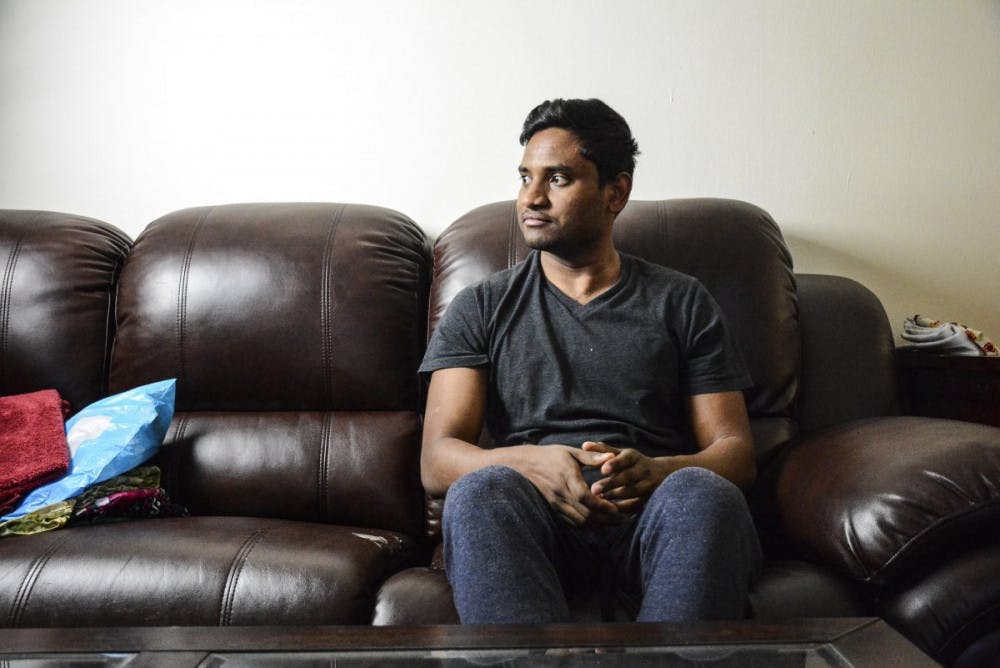Walking through the Ivy Hill apartments, the sun glares through the otherwise dimly lit hallway. An elderly Russian woman throws her trash out with a smile washed across her face. She does not speak English, but she tries to form words and shakes her head in frustration. “Russia,” she says, explaining her lack of communication.
For many students, the apartments at Ivy Hill Park are synonymous with cheap housing, late nights and the overall college experience. However, outside of the Seton Hall bubble, the Ivy Hill apartments are teeming with immigrants, elderly people, children in diapers, parents and various individuals who have no SHU ties.

The hallways change scent from floor to floor. One floor has a hint of mustiness, while another smells of a home cooked meal. Down an elevator ride, a father opens the door as his little girl is laughing in the background, running around their living space in just a diaper. They’re on their way out, or trying to be.
Some doors seem vacant without even a welcome mat outside. Other doors have mats that look like they have welcomed more than 100,000 visitors, as the edges fray.
Behind one door appears a Rutgers University student, Bethlehem Assegido. He is a 22-year-old biology major who says that the biggest struggle is not living with students from the “rival school (SHU),” but that parking gets a little tricky at Ivy.
After knocking twice on a door on the fifth floor, a woman from Bangladesh answers. She is just visiting, but defers to her brother who has lived in Ivy Hill since he was 11-years-old. Going on his 18th year living here, the Ivy Hill Park Apartments are home for Shah Mamun Ahmed.
“My uncle lived here when my family decided to come to America so he helped us find a place in Ivy,” Ahmed said. “It has been home ever since.”
The apartment on the inside is small and conventional. No frills. The walls have chipped marks that are painted over. A lived-in space that is packed to capacity—a make shift bed is in the hallway leading to his living room. If more than two people stand in the hallway by his door it gets uncomfortable. Clothing is scattered about the apartment. The kitchen runs into the living room with no defining lines: on the same wall as the kitchen table is a bookshelf and behind that are professional photography lights that Ahmed uses in his spare time. His brother asks him for a book and he knows exactly where to turn to grab it.
Ahmed and one of his brothers live on the fifth floor while another brother and their mom live on the first floor. As Ahmed is standing in the doorway, his older brother from the first floor comes up to visit, holding his 4-month-old son. It is a family affair. The brothers giggle at all of the family connections they have in Ivy. Both of the brothers grew up here, went to college and are now working in finance.
Ahmed said that he has seen a lot more Seton Hall students at Ivy in recent years compared to before. A hot spot for him to meet SHU students is in the elevator, allowing his conversations to usually last for about 15 seconds. His older brother jokes that because he is on the first floor and has no access to the elevator he is deprived of the SHU student interaction.
Ahmed said the Seton Hall students are usually pleasant and never bother him too much. The only time he has criticized SHU students is on party nights with loud music and excitement at peculiar hours.
“One time I went down to my friend’s apartment at night and there were Seton Hall students that were being loud…probably partying,” Ahmed said laughing. “We were just like ‘what are they doing in there?’”
For Ahmed, the best part of living in Ivy is the diversity. He is so passionate about the community that he even made an 11 minute long YouTube video about what it is like to live at Ivy Hill for a day. The link to his video is: https://www.youtube.com/watch?v=paXqchLtVO8.
According to the Ivy Hill Park website, apartments range from $700 a month to $950 a month. Ivy is a Section 8 housing complex, meaning the landlord can rent apartments at fair market rates to qualified low income tenants. The federal government subsidizes the rent.
This type of housing draws people from all walks of life.
“It’s extremely important to be exposed to diverse communities,” Ahmed said. “It is the best way to have biases disappear.”
Ahmed said the best way to learn about other people is to travel, but traveling is expensive.
“If you can’t travel, come to Ivy,” Ahmed said. “Living in Ivy is like traveling because of all of the people that you meet.”
A nurse opens the door on another floor as she is tending to a patient who is lying in bed. She hurriedly closes the door and gets back to work, prepping the man for a trip to the hospital.
Exiting the elevator is Nelly Duarte from Honduras, taking her cart to do laundry in the same place that she has for the past 9 years.
Keisha Washington walks her dog, Candy, outside. She is a dog groomer by trade and has lived in Ivy for about six years.
“The best thing about Ivy is that it is pet friendly,” Keisha said. “Pet friendly and diverse.”
Keisha turns the other way and continues on her walk with Candy. A woman stands on the corner looking like she is waiting for a ride. A Seton Hall student approaches the big black Wilden Place Pedestrian Gate, across the street, swipes her ID and enters a different world.
Siobhan McGirl can be reached at siobhan.mcgirl@student.shu.edu.





